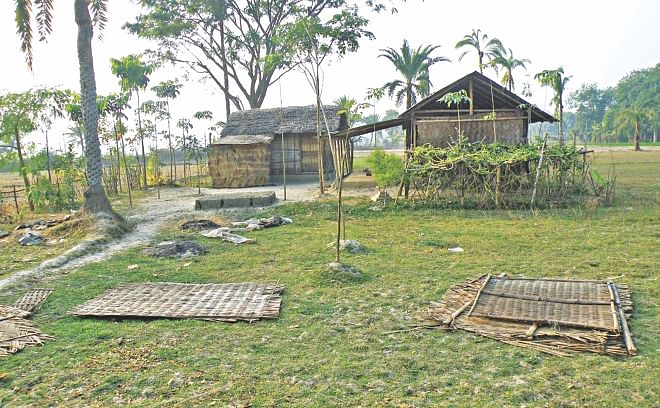Rape used as a weapon
Rape used as a weapon
About 5,000 people in Monirampur under threat

Twelve years ago, six families lived in Tuniaghara village of Monirampur upazila. They had 630 decimals of agro-land and another 105 decimals of homesteads with ponds.
All cobblers by profession, they were members of the Hindu Rishi community.
But things changed soon after the BNP-Jamaat alliance came to power in 2001.
Some Muslims of the adjacent areas had eyes on the properties and women of the low caste Hindu families. One night, two housewives were forced into a nearby field and gang-raped.
What the Rishi community could do at the most was file a case with Monirampur Police Station. But police took no action.
What could they do then?
“All the families left their village, selling out their land within 15 days of the incident,” said Jatin Das, a relative of one of the rape victims.
They had to sell out all their land to local Muslims at only Tk 5,000 a bigha (42 decimals) and homestead land at Tk 7,000 a bigha, around one-fourth of the real price.
Today the price of one bigha land in the village, which is by Jessore-Kashabpur village, is around Tk 6 lakh.
Before leaving, they went to the police station time and again. But the case got buried.
“We never let our next generation know what happened to us,” said Krishna Das, one of the displaced Hindus.
Krishna now lives in Jessore town with some of his community members. Some from the six families settled in Dhakuria and Chalkidanga. They never went back to Tuniaghara.
Twelve years later, another rape led to the deportation of four Rishi families in Hazrail village of the same upazila, Monirampur, a BNP-Jamaat stronghold.
The families had built their homes in a corner of the village. Since the incident on the night of January 7, they have been living elsewhere with relatives and trying to sell their land. They even took away their huts, breaking them into pieces.
This will make other Hindus sell land, according to locals. The victim families have only five decimals of land, but some other Hindu families have some croplands in the village.
Now youths in Hazrail and adjacent villages have to remain vigilant all night long to protect their families.
“Rape has become a weapon to displace Rishi families from their land in Monirampur. Silent torture is also going on but nobody utters a word in fear of a backlash,” said Ashok Das, general secretary of Bangladesh Dalit Parishad, an organisation working on the rights of low-caste Hindus.
“We have little to do to protect the low-caste Hindus from repression, except drawing the attention of the media. It's the government's duty to protect the minorities.”
According to an estimate, about 5,000 Rishi people of 1,000 families in 15 localities under six unions -- Bhojgati, Haridaskati, Kashimnagar, Durbadanga, Shyamkur and Dhakuria -- in the upazila are now vulnerable to communal violence.
Contacted, Officer-in-Charge Mir Rezaul Islam of Monirampur Police Station said, police patrolling was on to protect Hindu neighbourhoods in Monirampur. “We have also arranged a community watch.”